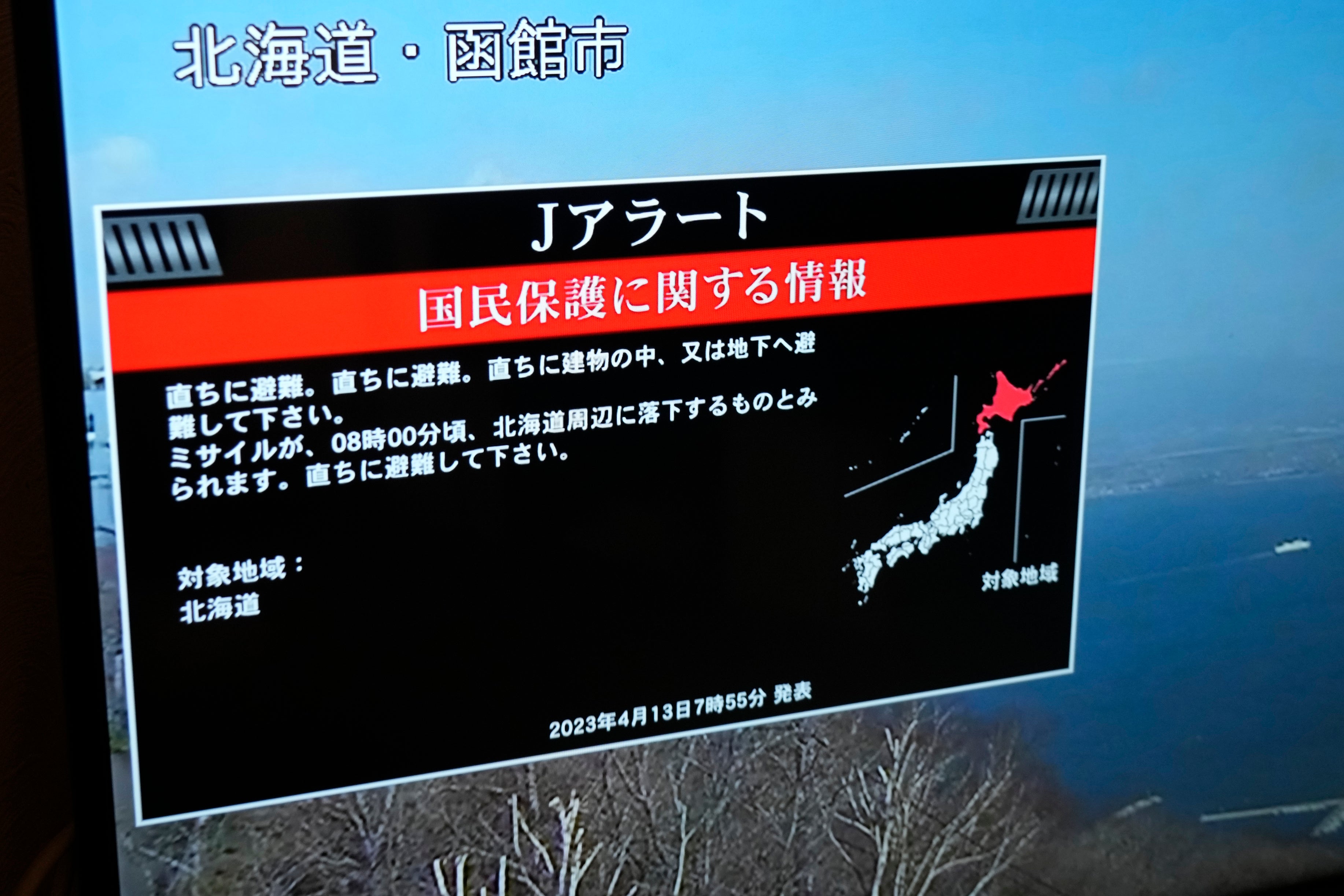North Korea launches ‘new type’ of ICBM triggering evacuations in Japan
New missile test could be a breakthrough for country’s ICBM arsenal
North Korea launched an intercontinental ballistic missile (ICBM) of intermediate range or longer, prompting Japan to issue an immediate evacuation order for residents on Hokkaido island.
The North’s latest launch is possibly a test for a new type of weapon system and could be a potential breakthrough. The new missile test could be a breakthrough for Pyongyang’s ICBM arsenal that is banned by the UN.
The missile test led to Japan issuing an immediate evacuation order for residents on Hokkaido island, which was later retracted after authorities ascertained it did not fall into their territory.
The missile was fired from the vicinity of the capital Pyongyang at 7.23am local and it flew 1,000km before splashing in the waters between the Korean Peninsula and Japan, South Korea’s joint chiefs of staff (JCS) said.
The apogee, or maximum altitude of the missile, has not been disclosed but it was initially reported that the missile was launched at a high angle.
A South Korean defence official said under anonymity that it was possibly a new type of ballistic missile, possibly using solid fuel.
South Korea’s military said it was not ruling out that it could be a solid-fuel missile, a new weapon system displayed at recent North Korean military parades.
So far Pyongyang is known to have tested liquid-fuelled ICBMs. But a solid-propellant ICBM, which can be launched from land or submarines, has been one of the key high-tech weapons on leader Kim Jong-un’s wishlist.

Pyongyang has been working to build more solid-fuel missiles, which are easier to store and transport, and can be launched with almost no warning or preparation time.
If confirmed by North Korea, it would be the first test by the country of a weapon system and the first test of an ICBM since last month.
The country had tested a liquid-fuelled Hwasong-17 ICBM on 16 March under Mr Kim’s supervision.
The missile test, of which details are still emerging, prompted the nuclear envoys of South Korea, US and Japan to hold a telephone conversation and Japanese prime minister Fumio Kishida to hold an emergency National Security Council meeting in Seoul.
The top envoys observing the North’s nuclear programme development called for a “decisive and united international response” to North Korean provocations and stronger efforts to stem illicit North Korean activities, that allegedly fund its weapons programme, during the call.
The missile launch took place as South Korean officials said North Korea has not been responding to calls on a set of cross-border inter-Korean hotlines for about a week.
The missile appeared to have been fired eastward at a high angle and did not fall into Japanese territory, Japan’s defence minister Yasukazu Hamada said, adding that the ministry was analysing the launch for more details.

The Japanese government warned residents of the island of Hokkaido to take immediate cover, saying a missile was likely to fall near it around 8am Japan time (2300 GMT).
It retracted the alert after the missile disappeared from Japan’s radar immediately after detection, chief cabinet secretary Hirokazu Matsuno, said. He said the alert was not a mistake.
The alert to take cover and evacuate caused a momentary alarm at a train station in Hokkaido, a student told Japanese broadcaster NHK.
“For a second in the train there was panic, but a station worker said to calm down, and people did,” the unidentified man said.
The missile launch comes days after Mr Kim said he would enhance his nuclear capability in “practical and offensive” ways.
The US “strongly condemned North Korea for its test of a long-range ballistic missile”, the White House said in a statement, renewing its offer to open talks.
“The door has not closed on diplomacy, but Pyongyang must immediately cease its destabilizing actions and instead choose diplomatic engagement,” US National Security Council spokesperson Adrienne Watson said in a statement.
Leif-Eric Easley, a professor at Ewha University in Seoul, said Mr Kim is risking escalation in tensions and is not yet done demonstrating Pyongyang’s nuclear delivery capabilities.
“Pyongyang’s provocations continue past its protest of US-South Korea defence exercises because Kim Jong-un hasn’t finished demonstrating his nuclear delivery capabilities yet,” he said.
“However, with the North Koreans literally not answering the phone, the lack of hotlines and diplomacy increases the risk of unintended escalation.”
The incident also comes a day after Japan announced plans to develop and build an array of advanced long-range missiles to improve the country’s defences.
The Japanese Defense Ministry said it had signed contracts with Mitsubishi Heavy Industries to produce the weapons.
Additional reporting by agencies
Join our commenting forum
Join thought-provoking conversations, follow other Independent readers and see their replies
Comments


Bookmark popover
Removed from bookmarks